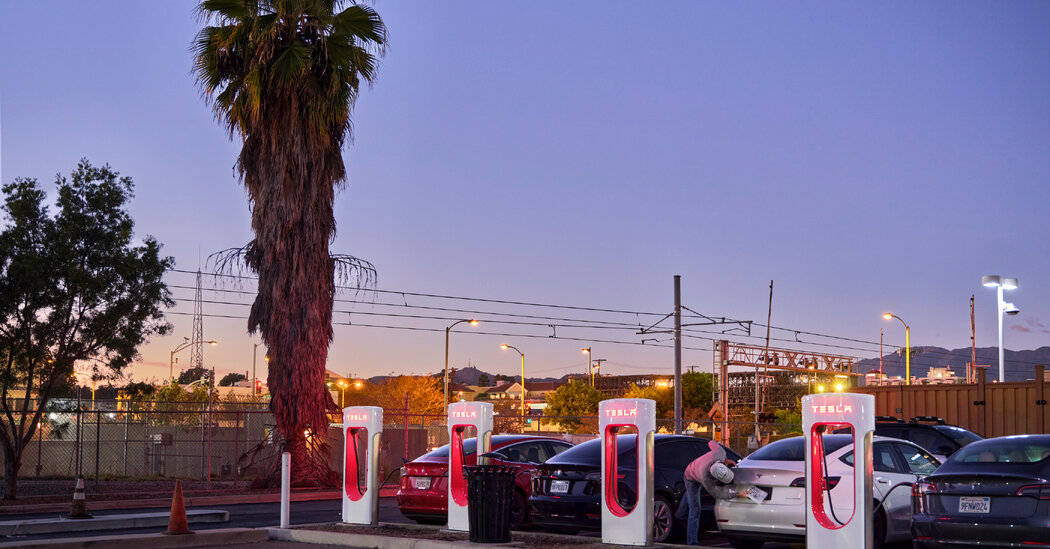Impact of Auto Tariffs Announced by President Trump on Major Automakers
Recent tariffs on cars and auto parts, announced by President Trump, are expected to have significant implications for various automakers, both in the U.S. and globally. The potential effects will vary among companies due to their unique operational strategies and supply chains.
Tesla: Navigating Challenges with Domestic Production
Tesla, under the leadership of CEO Elon Musk, manufactures its vehicles primarily in California and Texas, which provides a level of insulation from the newly imposed tariffs. However, the company sources about 25% of its vehicle components from international suppliers, as noted by the National Highway Traffic Safety Administration.
Despite its domestic operations, Tesla is facing declining sales, partly due to political controversies surrounding Musk that have alienated some consumers. Additionally, international retaliatory measures could target Tesla, with certain regions, like provinces in Canada, already halting rebate programs for Tesla electric vehicle purchases.
General Motors: A Mixed Bag
General Motors (GM), the largest U.S. automaker, relies heavily on imports for many of its best-selling models, particularly those manufactured in Mexico. Approximately 40% of GM’s U.S. sales last year came from vehicles assembled outside the U.S., highlighting its vulnerability to tariff impacts.
Fortunately, GM has performed strongly financially over recent years, positioning it better than some competitors to endure these tariffs, especially if there’s a possibility for their removal or reduction by the administration.
Ford Motor Company: Domestic Strengths Yet Foreign Dependencies
Ford boasts a considerable domestic manufacturing footprint, with around 80% of its U.S. sales produced within the country. This significant domestic presence offers Ford a shield against the 25% tariff on imported vehicles.
Nonetheless, Ford is still reliant on foreign-produced components, such as engines made in Ontario. The company has also reported significant losses in its electric vehicle sector, including models like the Mustang Mach-E that are produced in Mexico.
Stellantis: A Company in Transition
Stellantis, formed from the merger of Fiat Chrysler and Peugeot, manufactures popular models such as Ram trucks and the Chrysler Pacifica minivan in overseas plants, predominantly in Mexico. The company, facing sales declines and seeking new leadership, might be at a higher risk due to the potential longevity of the tariffs.
Toyota: A Strong Global Player
Toyota, the world’s largest automaker, sold 2.3 million vehicles in the U.S. last year, with around one million units originating from overseas, including Canada and Mexico. While this reliance poses challenges, Toyota’s strong profitability and reputation for effective management provide a buffer against the tariff impacts.
Volkswagen: Struggling in a Competitive Landscape
Volkswagen, Europe’s largest automaker, is likely to face significant challenges due to tariffs, as its sole U.S. production facility is located in Chattanooga, Tennessee. The company imports a large volume of cars, which could drastically increase costs under new tariffs.
Furthermore, financial difficulties in recent years, exacerbated by declining sales in China, could make it harder for Volkswagen to navigate the U.S. market amid these new tariff pressures.
Hyundai and Kia: Growth Amid Challenges
Hyundai and Kia have seen notable sales increases in the U.S. recently and are establishing a new electric vehicle factory in Georgia to bolster local production. Despite these advancements, they remain exposed to tariffs on the multitude of vehicles imported from South Korea, a situation influenced by prior trade agreements.
Hyundai’s executive chair, Euisun Chung, announced a further investment of $21 billion in the U.S., which could help mitigate some impacts of tariffs on their operations.


